Impacts of Dams on Freshwater Turtles: A Global Review to Identify Conservation Solutions
IF 1.6
4区 环境科学与生态学
Q2 BIODIVERSITY CONSERVATION
引用次数: 7
Abstract
Background and Research Aims Dams impact freshwater ecosystems and biodiversity. Freshwater turtles are at direct and indirect risk due to changes caused by damming including the loss of terrestrial and aquatic nesting habitats, changes to food availability, and blocking movement. Effective management of these impacts requires robust evidence in order to gain an understanding of conservation solutions that work. Methods We reviewed the global scientific literature that evaluated the impact of dams on freshwater turtles, and carried out additional searches of literature published in seventeen languages for studies evaluating actions to mitigate dam impacts. Results The search produced 47 published articles documenting dam impacts on 30 freshwater turtle species from seven families (Chelidae, Chelydridae, Emydidae, Geoemydidae, Kinosternidae, Podocnemididae, and Trionychidae) in 13 countries. Few studies were found from Europe and Asia and none from Africa. Most studies were from temperate latitudes, where studies focused more on adults and less threatened species compared with tropical latitudes. More than half of the studies (57%, n = 27) suggested actions to help mitigate dam impacts. Yet, only five studies (three temperate and two tropical) documented the effect of interventions (dam removal, flow management, artificial pond maintenance and community-based action). Conclusion These findings demonstrate a serious lack of documented evidence evaluating mitigation actions for dam impacts on freshwater turtles. Implications for Conservation This lack of evidence reinforces the importance of strengthening and maintaining robust long-term studies needed to develop effective and adaptive conservation actions for this group of threatened vertebrates particularly in tropical regions.水坝对淡水龟的影响:确定保护解决方案的全球综述
大坝影响淡水生态系统和生物多样性。由于筑坝造成的变化,包括陆地和水生筑巢栖息地的丧失、食物供应的变化以及迁徙受阻,淡水龟面临着直接和间接的风险。有效管理这些影响需要强有力的证据,以便了解有效的保护解决方案。方法我们回顾了评估大坝对淡水龟影响的全球科学文献,并对以17种语言发表的文献进行了额外的搜索,以评估减轻大坝影响的行动。结果该搜索产生了47篇已发表的文章,记录了大坝对13个国家7科(Chelidae、Chelydridae、Emydidae、Geoemyddae、Kinosternidae、Podocnemididae和Trionychidae)30种淡水龟物种的影响。欧洲和亚洲的研究很少,非洲的研究也没有。大多数研究都来自温带纬度地区,与热带纬度地区相比,那里的研究更多地关注成年物种和受威胁较小的物种。超过一半的研究(57%,n=27)建议采取行动帮助缓解大坝影响。然而,只有五项研究(三项温带研究和两项热带研究)记录了干预措施(大坝拆除、流量管理、人工池塘维护和社区行动)的效果。结论这些发现表明,严重缺乏文献证据来评估大坝对淡水龟影响的缓解措施。对保护的影响这种证据的缺乏加强了加强和保持强有力的长期研究的重要性,这些研究是为这类受威胁脊椎动物制定有效和适应性保护行动所必需的,特别是在热带地区。
本文章由计算机程序翻译,如有差异,请以英文原文为准。
求助全文
约1分钟内获得全文
求助全文
来源期刊

Tropical Conservation Science
BIODIVERSITY CONSERVATION-
CiteScore
3.60
自引率
5.90%
发文量
16
审稿时长
>12 weeks
期刊介绍:
Tropical Conservation Science is a peer-reviewed, open access journal that publishes original research papers and state-of-the-art reviews of broad interest to the field of conservation of tropical forests and of other tropical ecosystems.
 求助内容:
求助内容: 应助结果提醒方式:
应助结果提醒方式:


